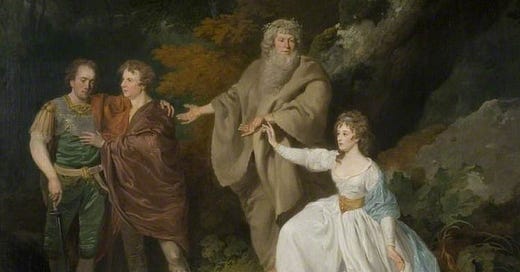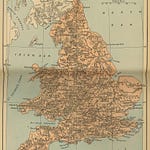The greatest poet and playwright who ever lived has been working on the stage for many years, as a writer, an actor, a director, and the all-purpose manager of his theater company at The Globe, in London. Time for a rest! And so he, William Shakespeare, comes out to the edge of the stage for his final appearance, to beg a gracious farewell and a bon voyage from his audience. Oh, he’ll keep his hand in for a while, helping to write a couple of later plays for his friend John Fletcher, and maybe he’ll show up on the boards for a bit of comedy in a play by another one of his friends, the great Ben Jonson. But his really charming leave-taking is our Poem of the Week, below — at least, many critics have imagined it so.
It was common, at the end of a comedy, for one of the characters to step out and address the audience directly, in an epilogue, asking for pardon if the actors have been clumsy or the play’s been not that great, but in reality giving them encouragement to clap their hands and cheer. That’s what Puck does at the end of A Midsummer Night’s Dream. “Give me your hands, if we be friends,” he cries, “and Robin shall restore amends.” But The Tempest is a play that is about forgiveness — really, about resurrection from the dead, and being born anew, as are all four of Shakespeare’s final plays; somehow or other, they’ve all got Easter and Christmas in them together. And if our guess is right, and Shakespeare himself played his main character, Prospero, the wise old man with the magic charms, the architect of all the action in the play, as if he were author and actor and director all at once, and if he is the one who is bidding farewell, and if some of the people in the audience know it, then what a dramatic moment it must have been!
But I should explain a little about the play. Prospero was the duke of Milan, but he wasn’t interested in governing; he liked to retire to his books, and he let his brother Antonio do the main work instead. That awaked an evil nature in Antonio, who conspired with Alonso the king of Naples, and Alonso’s brother Sebastian, to supplant Prospero. They smuggled him and his infant daughter Miranda aboard a rotten ship, and trusted that they would die at sea, and the people of Milan, who loved Prospero, would never know about it. But God preserved them. A good friend of Prospero, an old Neapolitan named Gonzalo, made sure they had plenty of food and drink, and that Prospero had his books, too. So Prospero and Miranda were marooned on an island, where the only living creatures are spirits of the air, like the noble Ariel, and a hag-born half-human monster, Caliban.
There they live for many years; Miranda grows to be a teenage girl, of marrying age; and there, by Prospero’s magic, Alonso, Sebastian, Antonio, Gonzalo, Alonso’s handsome and virtuous son Ferdinand, and their courtiers are also marooned, by a tempest that gives the play its name, and by the apparent wreck of their ship. The men of sin must repent — though only Alonso is ready to do so, because he believes that his son has been drowned, and that he is responsible. The others — Antonio and Sebastian — would add a couple of murders to the evil they have already committed, so that Sebastian would become King of Naples in his brother’s place. But Prospero, with the help of the spirit Ariel, prevents that from happening. And of course, Ferdinand must meet Miranda, and they must fall in love; she, with the first young man she has ever seen in her life.
I could go on for a long time, but I trust you get the idea. The ship was not wrecked after all. Prospero’s dukedom is restored to him. Alonso is a new man, deeply sorry for his sins, and rejoicing to see his son alive and with the beautiful and pure-hearted Miranda. Even Caliban learns something. Sin and death did not have the last word. And now the wizard, Shakespeare, in the person of Prospero, echoes the words of the Lord’s Prayer, and begs our indulgence, and our gratitude; because now we are the ones with the magic power, and unless we use it for his good, he will be stranded on that island forever:
Now my charms are all o'erthrown, And what strength I have's mine own, Which is most faint. Now 'tis true I must be here confined by you, Or sent to Naples. Let me not, Since I have my dukedom got And pardoned the deceiver, dwell In this bare island by your spell; But release me from my bands With the help of your good hands. Gentle breath of yours my sails Must fill, or else my project fails, Which was to please. Now I want Spirits to enforce, art to enchant, And my ending is despair Unless I be relieved by prayer, Which pardons so that it assaults Mercy itself and frees all faults. As you from crimes would pardoned be, Let your indulgence set me free.
Word & Song by Anthony Esolen is an online magazine devoted to reclaiming the good, the beautiful, and the true. We publish six essays each week, on words, classic hymn, poems, films, and popular songs, as well a weekly podcast, alternately Poetry Aloud or Anthony Esolen Speaks. To support this project, please join us as a free or paid subscriber. Learn more about our subscription tiers by clicking the button below















Share this post